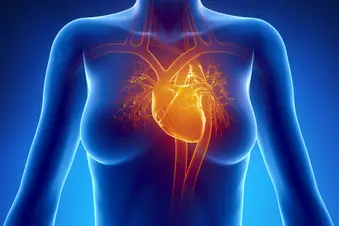
Hypertrophic cardiomyopathy (HCM) is most commonly caused by
- Abnormal genes
- Diet
- A virus
HCM thickens your heart’s
- Arteries
- Muscle
- Valves
Thicker heart muscle means it pumps
- More blood than usual
- Less blood than usual
- Slower than usual
HCM has a cure.
- True
- False
Adults with a close relative with HCM should get screened
- Once a month
- Once a year
- Every 3-5 years
You’re most likely to get an HCM diagnosis
- As a child
- As a teen
- In middle age
You can prevent hypertrophic cardiomyopathy.
- True
- False
HCM affects 1 in ___ Americans.
- 50
- 500
- 5,000
Many people who have HCM have no symptoms.
- True
- False
HCM can affect your breathing.
- True
- False
Moderate exercise is generally safe if you have HCM.
- True
- False